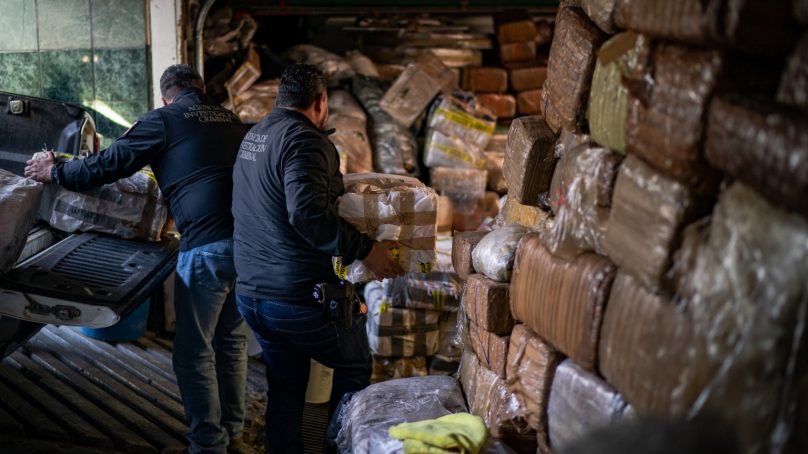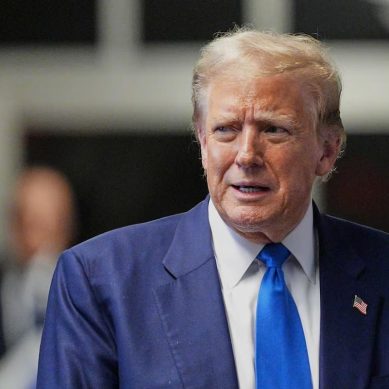
The US government is frustrated that Mexican President Andrés Manuel López Obrador is prioritising social spending for the benefit of his people over addressing matters that are important to the US, according to an excerpt of a leaked top-secret intelligence document.
Part of a cache of classified intelligence records that were leaked on the platform Discord earlier this year, the document highlights the growing discontent by US officials toward Mexico’s president, who has significantly limited US law enforcement agencies’ role in the war on drugs, as fentanyl trafficked by Mexican criminal groups has worsened the overdose crisis in the US and violence in Mexico.
“President Lopez Obrador’s federal budget for 2023 gives priority to social spending and signature infrastructure projects, rather than the investments needed to address bilateral issues with the US such as migration, security, and trade,” reads the document from the Office of the Director of National Intelligence.
“Lopez Obrador’s meagre investment in migration, security and trade-related organisations will probably undermine Mexico’s ability to follow through on commitments to stem the flow of irregular migrants and fentanyl to the US and boost economic competitiveness in North America.”
López Obrador’s 2023 federal budget, presented to the Mexican Congress last fall, does increase funding for social programmes, including a significant raise for the pension provided to older Mexicans. It also prioritises large infrastructure projects, which are mostly concentrated in southern states of the country.
“The crisis of fentanyl is due to the negligence of pharmaceuticals in the US,” said Carlos Pérez Ricart, a professor at the Centre for Research and Teaching in Economics in Mexico City. “I don’t know what [the Director of National Intelligence] thinks the alternative is. Do they expect us to end our social spending and infrastructure policy to tend to a problem that belongs to the US?”
The document, from February of this year, is part of a trove of records leaked to a Discord server, allegedly by Jack Douglas Teixeira, a member of the Air National Guard, and posted online by DDoSecrets, a collective that publishes leaked documents. While reporting on the documents has mostly focused on intelligence on the war in Ukraine, some records include US insight into other regions. Last month, the Washington Post reported on documents showing US intelligence agencies intercepted communication between Mexican cartel members.
After the Drug Enforcement Administration carried out an operation in Mexico and US prosecutors filed charges against 28 members of the Sinaloa Cartel, López Obrador responded with anger toward the US intelligence gathering efforts, saying it was “abusive, arrogant interference.”
The Office of the Director of National Intelligence and the Drug Enforcement Administration did not respond to requests for comment. Neither did López Obrador’s spokesperson.
During his tenure, López Obrador has done away with much of the security collaboration between the US and Mexico – a decades-long relationship that ramped up in the mid-2000s – by placing stringent limits on the US Drug Enforcement Agency and other US law enforcement agencies operating in Mexico. Yet the Mexican president has continued to closely cooperate with the US on migration.
Just this month, he reached a deal with the Biden administration, allowing the US to deport non-Mexicans to the country.
“It seems a little naive,” said Pérez Ricart of the Director of National Intelligence’s apparent frustration with Mexico’s approach to migration. “Mexico, in a large part, is doing the US’s dirty work in terms of migration.”
López Obrador took office in 2018 in a landslide victory, calling his populist political project “the Fourth Transformation,” a reference to three major leaps in Mexican history: the independence from Spain, the Reform (a mid-1800s war between conservatives and liberals) and the Mexican Revolution. His election was a welcome change for many Mexicans, who had grown tired of the decades-long rule of the two centre- and right-wing parties.
Since then, his relationship with the US has been erratic and wracked with contradictions. López Obrador has spent the past five years walking a tightrope: He has had to balance the interests of the US, the Mexican business class, and his base – providing concessions to all. Support for López Obrador among Mexicans remains relatively high, with approval ratings at 65 per cent, most likely due to the social welfare programmes he has introduced.
López Obrador’s government has raised the minimum wage and provided cash and food assistance to older Mexicans, as well as scholarships for students nationwide.
López Obrador’s government has also placed major emphasis on infrastructure and development projects in Mexico. The projects include a new international airport and a railway that will connect the Pacific and Atlantic oceans, which seeks to compete with the Panama Canal. Another major project, called the Maya Train, is reaching completion. The controversial project, which seeks to traverse the Yucatán Peninsula, has received ire from left- and right-wing critics alike for its environmental damage. It has already taken out vast sectors of the rainforest.
“What AMLO has been doing has been investing in infrastructure projects in the south of the country,” Earl Anthony Wayne, who served as US ambassador to Mexico from 2011 to 2015, told The Intercept. “That’s less of a priority for us” – the United States – “because we trade mostly with the centre and northern parts of the country where all the productive enterprises are.”
- The Intercept report











